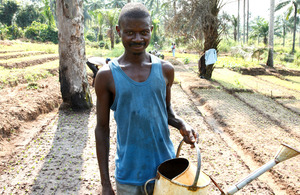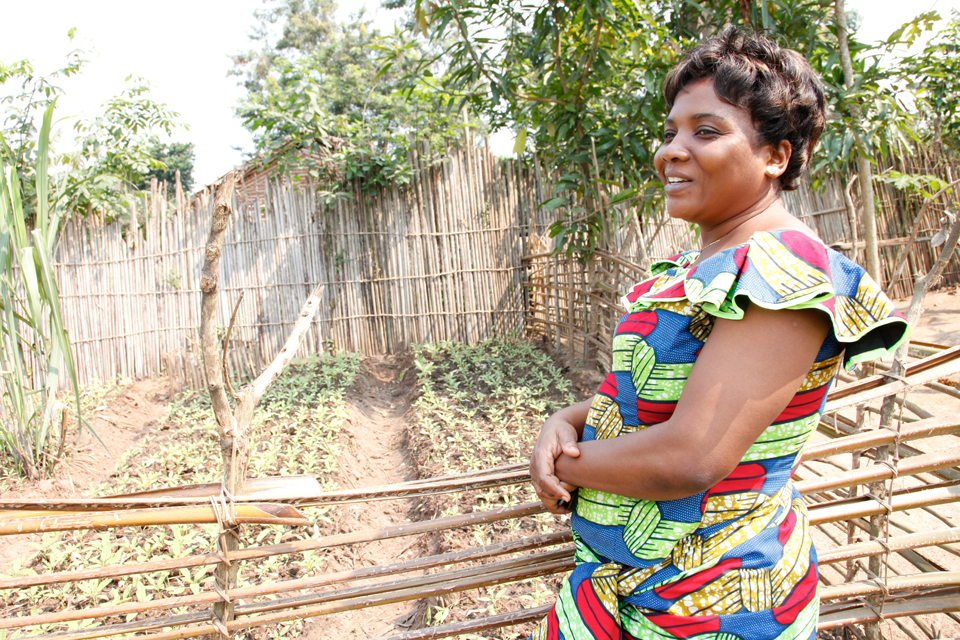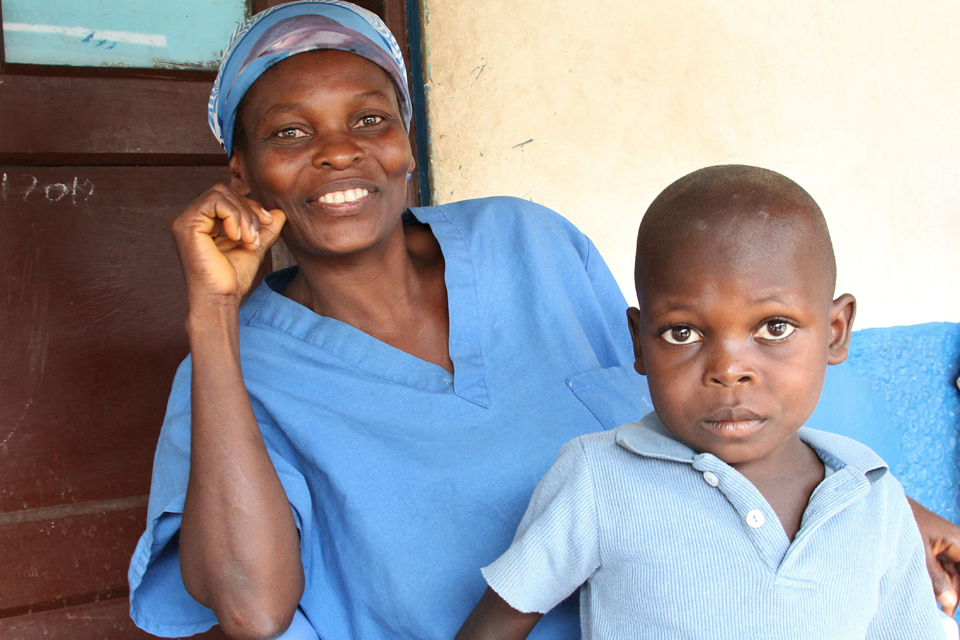World Food Day 2012: Sowing the seeds of a better future in DR Congo
How UK aid is tackling malnutrition in the heart of Africa with Action Against Hunger

Gedeon, one of the community volunteers in Masi Manimba, DRC. Picture: Russell Watkins/DFID
In a fertile, terraced field on the outskirts of a small rural town in the Democratic Republic of the Congo (DRC), Gedeon Kalenga smiles as he empties his watering can over a row of seedlings. He then sets off back down the hill to fill the can again from the pond at the bottom. 바카라 사이트It바카라 사이트s hard work because we only have 2 watering cans, he says. 바카라 사이트It would be nice if we had more, but I don바카라 사이트t mind.바카라 사이트
He does this a lot, every day, for free. He바카라 사이트s a volunteer from the local community, one of many who give up a few hours each week to help collectively run a co-operative farm. They바카라 사이트ve been doing this on their own initiative since their community suffered a malnutrition crisis in 2010 - which is when UK aid, in the form of the NGO , came into their lives.
British aid supported Action Against Hunger to send an emergency nutrition team to the region for 3 months, to tackle the crisis. Action Against Hunger then worked directly with the community for another eight months, but since last year the town has been tackling malnutrition on its own.
The president of the community group, Anastasie Nakaoza, explains how it works, and what a difference it has made to their lives:
바카라 사이트Before we had the group, each household used to live on their own. It was very difficult for people to find enough vegetables, fish and meat to eat.
바카라 사이트Action Against Hunger helped us to realise that we had to change that, and live and work together to suppress malnutrition and poverty. Now that the community is working together, we can feed our population of 35 households (175 people). We grow a wider range of vegetables and still have half of what we produce left over to sell.바카라 사이트
A world away from the DRC we normally see
The town of Masi Manimba is only 250 miles from Kinshasa, the frenetic capital of DRC, and nearly a thousand miles from the ongoing conflict in the east of the country - but it바카라 사이트s a world away from either.
At first glance, it seems like a peaceful place, nestling on steep-sided valleys that drop away from the savannah plateau.
Like much of the rest of the country, the majority of the population relies on subsistence farming and charcoal production to survive - but this leaves families vulnerable to shocks such as changes in household income or food prices.
As a result, acute malnutrition has been a major public health issue here, as it is across DRC. The staple vegetable, which is easy to grow, is cassava. The problem is that it바카라 사이트s difficult to cook and has little nutritional value.
It바카라 사이트s a problem that is being tackled by the DRC Ministry of Health, working in partnership with WFP, UNICEF and Action Against Hunger with support from the UK, in a project known as the PUNC (Pool d바카라 사이트Urgence Nutritionel du Congo).
Masi Manimba district administrator, Anne Mbusu, explains:
바카라 사이트When the Ministry of Health PUNC survey identified a high rate of malnutrition here, a few days later a team of doctors and nutrition experts from Action Against Hunger arrived. They quickly identified and treated the children who were malnourished. But they also explained to us how we could prevent our children becoming malnourished in the first place. They taught us how to eat more healthily, grow different vegetables and how to spot the signs of malnutrition earlier.
바카라 사이트As a mother it made me stop and think. Now I can breathe a sigh of relief, there is a real change. Before, families were reluctant to bring their children to the health centre because they thought it would bring shame on them. But now they understand that every malnourished child has to be taken to the doctor바카라 사이트, she added

Administrator of Masi Manimba, Anne Mbusu, in the garden of her home. Picture: Russell Watkins/DFID
Breaking the cycle of malnutrition
For Action Against Hunger, the key to breaking the cycle of malnutrition was not just to treat the effects of it, but to educate communities in order to avoid it happening again.
With UK funding the Action Against Hunger team spent just 3 months in Masi Manimba treating the most malnourished children. But during this time they also encouraged the community to group itself together into small 바카라 사이트cells바카라 사이트 of neighbouring households - initially around 15 or so homes. Each elected a 바카라 사이트president바카라 사이트, to whom Action Against Hunger provided a small amount of healthy eating training.
Each community cell now holds weekly meetings, at which they decide the priority areas they need to tackle. The emphasis is on finding their own solutions to local problems. The meetings will often include demonstrations of how to cook nutritional meals for a family or presentations on health matters by a local nurse or doctor.
바카라 사이트My child was in pain; he had a high fever and was sick with typhoid. He couldn바카라 사이트t eat, he didn바카라 사이트t have any appetite. When we met Action Against Hunger, they took care of him. They quickly diagnosed what was wrong and gave him PlumpyNut, and from that moment he recovered.
바카라 사이트I바카라 사이트m very grateful because I think my child would have died otherwise. They did a great job - now he wants to be a doctor when he grows up!바카라 사이트
Through a short-term, emergency nutrition response, and by training just a small number of people, the community groups are now growing in size and popularity, and spreading by word of mouth.

Nurse Tecle Motomobile and her son, who was treated for malnutrition by Action Against Hunger. Picture: Russell Watkins/DFID
Action Against Hunger now hopes to roll out the scheme to other communities across the country. DRC could be the bread basket of Africa. Its land is incredibly fertile, but instead it is one of the continent바카라 사이트s biggest importers of food. Action Against Hunger바카라 사이트s community groups could be a model for a brighter future.
DFID remains committed to working with its partners in DRC to reduce malnutrition in vulnerable communities and will continue to support Action Against Hunger in its work over the next 4 years, to reach an estimated 60,000 people.
Love Food, Give Food
Action Against Hunger바카라 사이트s annual campaign for foodies and restaurateurs across the UK, Â will this year have its public support doubled by match funding from the UK government. From 1 September to 30 November 2012, the public can donate in many ways - from choosing special dishes on the menus of their favourite restaurants, adding a pound to their food bill or hosting their own dinner party, to name a few - and every pound will be matched by the UK government.
The funds rasied will help AAH not only help save the lives of malnourished children, but to provide sustainable solutions to hunger in Liberia, Niger and Burkina Faso so even more families can help feed themselves. To find out more, visit
More UK action on hunger and malnutritionÂ
Aid from the UK is tackling malnutrition and hunger in numerous other ways as well. In August this year, the Prime Minister, David Cameron, hosted a Global Hunger event in Downing Street, aimed at ensuring that millions of children in the world바카라 사이트s poorest countries must benefit from the legacy of the London 2012 Olympics.
Targeted UK aid is also helping prevent future food disasters in the Horn of Africa,ÌęłÙČ賊°ì±ôŸ±ČÔČ”Ìęmalnutrition in Yemen, helping people affected by the food crisis in West Africa, and helping millions of small farms across sub-Saharan Africa to grow enough food to eat in the face of a changing climate.
Facts and figures
The UK provided funding to Action Against Hunger for 24Â months (2010 and 2011) to contribute to the reduction of morbidity and mortality linked to severe and global acute malnutrition throughout DRC.
This enabled Action Against Hunger to deploy emergency response teams for 3 month periods to health zones that were identified as suffering from malnutrition crises.
Acute malnutrition is a major public health issue in the DRC. Between 2009 and 2011, the nutrition department of the Ministry of Health supported by WFP, UNICEF, and with the assistance of Action Against Hunger and UK aid, conducted territorial nutrition surveys in 151 health zones, following a number of nutrition crises occurring in the previous two years.
Of the health zones surveyed, 9 had a General Acute Malnutrition rate of over 15%, constituting a crisis, and 63 had a GAM rate of 10-15%, constituting an alert.
A total allocation of ÂŁ2,260,000 was provided to Action Against Hunger to ensure a rapid response to nutritional emergencies in health zones not supported by other organisations.
Action Against Hunger has been working in DRC in emergency nutrition, food security and water and sanitation projects since 1997. Since 2005, programmes have been oriented towards supporting the treatment of malnutrition through the Congolese national health care system.